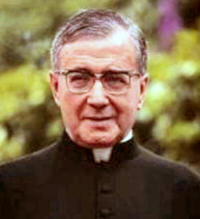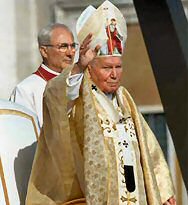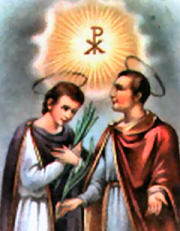21. Not every one that says to me, Lord, Lord, shall enter into the kingdom of heaven; but he that does the will of my Father which is in heaven.
22. Many will say to me in that day, Lord, Lord, have we not prophesied in your name? and in your name have cast out devils? and in your name done many wonderful works?
23. And then will I profess to them, I never knew you: depart from me, you that work iniquity.
JEROME; As He had said above that those who have the robe of a good life are yet not to be received because of the impiety of their doctrines; so now on the other hand, He forbids is to participate the faith with those who while they are strong in sound doctrine, destroy it with civil works for it is necessary that the servants of God that both their work should be approved by their teaching and their teaching by their works. And therefore He says, Not every one that says to me, Lord, Lord, enters into the kingdom of heaven.
CHRYS. Wherein He seems to touch the Jews chiefly who placed everything in dogmas; as Paul accuses then, If you are called a Jew, and rest in the Law.
PSEUDO-CHRYS. Otherwise; having taught that the false prophets and the true are to be discerned by their fruits, He now goes on to teach more plainly what are the fruits by which we are to discern the godly from the ungodly teachers.
AUG. For even in the very name of Christ we must be on our guard against heretics, and all that understand amiss and love this world, that we may not be deceived, and therefore He says, Not every one that says to me, Lord, Lord. But it may fairly create a difficulty how this is to he reconciled with of the Apostle, No man can say that Jesus is the Lord, but by the Holy Ghost. For we cannot say that those who are not to enter into the kingdom of heaven have the Holy Spirit. But the Apostle uses the word 'say,' to express the will and understanding of him that says it. He only properly says a thing, who by the sound of his voice depresses his will and purpose. But the Lord uses the word in its ordinary sense, for he seems to say who neither wishes nor understands what he says.
JEROME; For Scripture uses to take words for deeds; according to which the Apostle declares, They make confession that they know God, but in works deny him.
AMBROSIASTER; For all truth by whomsoever uttered is from the Holy Spirit.
AUG. Let us not therefore think that this belongs to those fruits of which He had spoken above, when one says to our Lord, Lord, Lord; and thence seems to us to be a good tree; the true fruit spoken of is to do the will of God; whence it follows, But who does the will of my Father which is in heaven, he shall enter into the kingdom of heaven.
HILARY; For obeying God's will and not calling on His name, shall find the way to the heavenly kingdom.
PSEUDO-CHRYS. And what the will of God is the Lord Himself teaches, This is, He says, the will of him that sent me, that every man that sees the Son and believes on Him should have eternal life. The word believe has reference both to confession and conduct. He then who does not confess Christ, or does not walk according to His word shall not enter into the kingdom of heaven.
CHRYS He said not he that does My will, but the will of my Father, for it was fit so to adapt it in the meanwhile to their weakness. But the one secretly implied the other, seeing the will of the Son is no other than the will of the Father.
AUG. Hereto it also pertains that we he not deceived by the name of Christ not only in such as hear the name and do not the deeds, but yet more by certain works and miracles, such as the Lord wrought because of the unbelieving, but yet warned us that we should not be deceived by such to suppose that there was invisible wisdom where was a visible miracle; wherefore He adds, saying, Many shall say to me in that day.
CHRYS. See how He thus secretly brings in Himself. Here in the end of His sermon He shows Himself as the Judge. The punishment that awaits sinners He had shown before, but now only reveals who He is that shall punish, saying, Many shall say to me in that day.
PSEUDO-CHRYS. When, namely, He shall come in the majesty of His Father; when none shall any more dare with strife of many words either to defend a lie, or to speak against the truth, when each man's work shall speak, and his mouth be silent, when none shall come forward for another, but each shall fear for himself. For in that judgment the witnesses shall not he flattering men, but Angels speaking the truth, and the Judge is the righteous Lord; whence He closely images the cry of men fearful, and in straits, saying, Lord, Lord. For to call once is not enough for him who is under the necessity of terror.
HILARY. They even assure themselves of glory for their prophesying in teaching, for their casting out demons, for their mighty works; and hence promise themselves the kingdom of heaven, saying, Have we not prophesied in your name?
CHRYS. But there are that say that they spoke this falsely, and therefore were not saved. But they would not have dared to say this to the Judge in His presence. But the very answer and question prove that it was in His presence that they spoke thus. For having been here wondered at by all for the miracles which they wrought, and there seeing themselves punished, they say in wonderment, Lord, have we not prophesied in your name? Others again say, that they did sinful deeds not while they thus were working miracles, but at a time later. But if this be so, that very thing which the Lord desired to prove would not be established, namely, that neither faith nor miracles avail ought where there is not a good life; as Paul also declares, If I have faith that I may remove mountains, but have not charity, I am nothing.
PSEUDO-CHRYS. But note that He says, in my name, not in My Spirit; for they prophesy in the name of Christ, but with the spirit of the Devil; such are the diviners. But they may be known by this, that the Devil sometimes speaks falsely, the Holy Spirit never. Howbeit it is permitted to the Devil sometimes to speak the truth, that he may commend his lying by this his rare truth. Yet they cast out demons in the name of Christ, though they have the spirit of his enemy; or where, they do not cast them out, but seem only to cast them out but, the demons acting in concert with them. Also they do mighty works, that is, miracles, not such as are useful and necessary, but useless and fruitless.
AUG. Read also what things the Magi did in Egypt in withstanding Moses.
JEROME; Otherwise; To prophesy, to work wonders, to cast out demons by divine power, is often not of his deserts who performs the works, but either the invocation of Christ's name has this force; or it is suffered for the condemnation of those that invoke, or for the benefit of those that see and hear, that however they despise the men who work the wonders, they may give honor to God. So Saul and Balaam and Caiaphas prophesied; the sons of Sceva in the Acts of the Apostles were seen to cast out demons; and Judas with the soul of a traitor is related to have wrought many signs among the other Apostles.
CHRYS. For all are not. alike fit for all things; these are of pure life, but have not so great faith; those again have the reverse. Therefore God converted these by the means of those to the showing forth much faith; and those that had faith He called by this unspeakable gift of miracles to a better life; and to that end gave them this grace in great richness. And they may, We have done many mighty works. But because they were ungrateful towards those who thus honored them, it follows rightly, Then will I confess to you, I never knew you.
JEROME; Emphatically, Then will I confess, for a long time He had forborne to say it.
PSEUDO-CHRYS. For great wrath ought to be preceded by great forbearance, that the sentence of God may be made more just, and the death of the sinners more merited. God does not know sinners because they are not worthy that they should be known of God; not that He altogether is ignorant concerning them, but because He knows them not for His own. For God knows all men according to nature, but He seems not to know them for that He loves them not, as they seem not to know God who do not serve Him worthily.
CHRYS. He says to them, I never knew you, as it were, not at the day of judgment only, but not even then when you were working miracles. For there are many whom He has now in abhorrence, and yet turns away His wrath before their punishment.
JEROME; Note that He says, I never knew you, as being against some that say that all men have always been among rational creatures.
GREG. By this sentence it is given to us to learn, that among men Charity and humility, and not mighty works, are to be esteemed. Whence also now the Holy Church, if there be any miracles of heretics, despises them, because she knows that they have not the mark of holiness. And the proof of holiness is not to work miracles, but to love our neighbor as ourselves, to think truly of God, and of our neighbor better than of ourselves.
AUG. But never let it be said as the Manichees say, that the Lord spoke these things concerning the holy Prophets; He spoke of those who after the preaching of His Gospel seem to themselves to speak in His name not knowing what they speak.
HILARY; But thus the hypocrites boasted, as though they spoke somewhat of themselves, and as though the power of God did not work all these things, being invoked; but reading has brought them the knowledge of His doctrine, and the name of Christ casts out the demons. Out of our own selves then is that blessed eternity to be earned, and out of ourselves must be put forth something that we may will that which is good, that we may avoid all evil, and may rather do what He would have us do, than boast of that to which He enables us. These then He disowns and banishes for their evil works, saying, Depart from me, you that work iniquity.
JEROME; He says not, Who have worked, but, who work iniquity, that He should not seem to take away repentance. You, that is, who up to the present hour when the judgment is come, though you have not the opportunity, yet retain the desire of sinning.
PSEUDO-CHRYS. For death separates the soul from the body, but changes not the purpose of the heart.
24. Therefore whosoever hears these sayings of mine, and does them, I will liken him to a wise man, which built his house upon a rock:
25. And the rain descended, and the floods came, and the winds blew, and beat upon that house; and it fell not: for it was founded upon a rock.
26. And every one that hears these sayings of mine, and does them not, shall be likened to a foolish man, which built his house upon the sand:
27. And the rain descended, and the floods came, and the winds blew, and beat upon that house; and it fell: and great was the fall of it.
CHRYS. Because there would be some who would admire the things that were said by the Lord, but would not add that showing forth of them which is in action, He threatens them before, saying, Every man that hears these words of mine, and does them, shall be likened to a wise man.
PSEUDO-CHRYS. He said not, I will account him that hears and does, as wise; but, He shall be likened to a wise man. He then that is likened is a man; but to whom is he likened? To Christ; but Christ is the wise man who has built His house, that is, the Church, upon a rock, that is, upon the strength of the faith. The foolish man is the Devil, who has built his house, that is, all the ungodly, upon the sand, that is, the insecurity of unbelief, or upon the carnal, who are called the sand on account of their barrenness; both because they do not cleave together, but are scattered through the diversity of their opinions, and because they are innumerable. The rain is the doctrine that waters a man, the clouds are those from which the rain falls. Some are raised by the Holy Spirit, as the Apostles and Prophets, and some by the spirit of the Devil, as are the heretics. The good winds are the spirits of the different virtues, or the Angels who work invisibly in the senses of men, and lead them to good. The bad winds are the unclean spirits. The good floods are the Evangelists amid teachers of the people; the evil floods are men full of an unclean spirit, and overflowing with many words; such are philosophers and the other professors of worldly wisdom, out of whose belly come rivers of dead water. The Church then which Christ has founded, neither the rain of false doctrine shall sap, nor the blast of the Devil overturn, nor the rush of mighty floods remove. Nor does it contradict this, that certain of the Church do fall; for not all that are called Christians, are Christ's, but, The Lord knows them that are his. But against .that house that the Devil has built comes down the rain of true doctrine, the winds, that is, the graces of the Spirit, or the Angels; the floods, that is, the four Evangelists and the rest of the wise; and so the house falls, that is, the Gentile world, that Christ may rise; and the ruin of that house was great, its errors broken up, its falsehoods laid open, its idols through out the whole world broken down. He then is like to Christ, who hears Christ's words, and does them; for He builds on a rock, that is, upon Christ, who is all good, so that on whatsoever kind of good any one should build, he may seem to have built upon Christ. But as the Church built by Christ cannot be thrown down, so any such Christian who has built himself upon Christ, no adversity can overthrow, according to that, who shall separate us from the love of Christ? Like to the Devil is he that hears the words of Christ, and does them not. For words that are heard, amid are not done, are likened to sand, they are dispersed and shed abroad. For the sand signifies all evil, or even worldly goods. For as the Devil's house is overthrown, so such as are built upon the sand are destroyed and fall. And great is that ruin if he have suffered anything to fail of the foundation of faith; but not if he have committed fornication, or homicide, because he has whence he may arise through penitence, as David.
RABAN. Or the great ruin is to be understood that with which the Lord will say to them that hear and do not, Go you into everlasting fire.
JEROME; Or otherwise; On sand which is loose and cannot be bound into one mass, all the doctrine of heretics is built so as to fall.
HILARY; Otherwise; By the showers He signifies the allurements of smooth and gently invading pleasures, with which the faith is at first watered as with spreading rills, afterwards Comes down the rush of torrent floods, that is, the motions of fiercer desire, and lastly, the whole force of the driving tempests rages against it, that is, the universal spirits of the Devil's reign attack it.
AUG. Otherwise; Rain, when it is put to denote any evil, is understood as the darkness of superstition; rumors of men are compared to winds; the flood signifies the lust of the flesh, as it were flowing over the land, and because what is brought on by prosperity is broken off by adversity. None of these things does he fear who has his house founded upon a rock, that is, who not only hears the command of the Lord, but who also does it. And in all these He submits himself to danger, who hears and does not. For no man confirms in himself what the Lord commands, or himself hears, but by doing it. But it should He noted, that when He said, He that hears these words of mine, He shows plainly enough that this sermon is made complete by all those precepts by which the Christian life is formed, so that with good reason they that desire to live according to them, may be compared to one that builds on a rock.
28. And it came to pass, when Jesus had ended these sayings, the people were astonished at his doctrine:
29. For he taught them as one having authority, and not as the Scribes.
GLOSS. Having related Christ's teaching, He shows its effects on the multitude, saying, And it came to pass, when Jesus had ended these words, the multitude wondered at his doctrine.
RABAN. This ending pertains both to the finishing the words, and the completeness of the doctrines. That it is said that the multitude wondered, either signifies the unbelieving in the crowd, who were astonished because they did not believe the Savior's words; or is said of them all, in that they reverenced in Him the excellence of so great wisdom.
PSEUDO-CHRYS. The mind of man when satisfied reasonably brings forth praise, but when overcome, wonder. For whatever we are not able to praise worthily, we admire. Yet their admiration pertained rather to Christ's glory than to their faith, for had they believed on Christ, they would not have wondered. For wonder is raised by whatever Surpasses the appearance of the speaker or actor; and thence we do not wonder at what is done or said by God, because all things are less than God's power. But it was the multitude that wondered, that is the common people, not the chief among the people, who are not wont to hear with the desire of learning; but the simple folk heard in simplicity; had others been present they would have broken up their silence by contradicting, for where the greater knowledge is, there is the stronger malice. For He that is in haste to be first, is not content to be second.
AUG. From that which is here said, He seems to have left the crowd of disciples - those out of whom He chose twelve, whom He called Apostles - but Matthew omits to mention it. For to His disciples only, Jesus seems to have held this Sermon, which Matthew recounts, Luke omits. That after descending into a plain He held another like discourse, which Luke records, and Matthew omits. Still it may be supposed, that, as was said above, He delivered one and the same Sermon to the Apostles, and the rest of the multitude present, which has been recorded by Matthew and Luke, in different words, but with the same truth of substance; and this explains what is here said of the multitude wondering.
CHRYS. He adds the cause of their wonderment, saying, He taught them as one having authority, and not as the Scribes and Pharisees. But if the Scribes drove Him from them, seeing His power shown in works, how would they not have been offended when words only manifested His power? But this was not so with the multitude; for being of benevolent temper, it is easily persuaded by the word of truth. Such however was the power wherewith He taught them, that it drew many of them to Him, and caused them to wonder; and for their delight in those things which were spoken they did not leave Him even when He had done speaking; but followed Him as He came down from the mount. They were mostly astonished at His power, in that He spoke not referring to any other as the Prophets and Moses had spoken, but everywhere showing that He Himself had authority; for in delivering each law, He prefaced it with, But I say to you.
JEROME; For as the God and Lord of Moses Himself, He of His own free will either added such things as seemed omitted in the Law, or even changed some; as above we read, It was said by them of old. . . But I say to you. But the Scribes only taught the people what was written in Moses and the Prophets.
GREG. Or Christ spoke with especial power, because I He did no evil, from weakness, but we who are weak, in our weakness consider by what method in teaching we may best consult for our weak brethren.
HILARY; Or; They measure the efficacy of His power, by the might of His words.
AUG. This is what is signified in the eleventh Psalm, I will deal mightily with him; the words of the Lord are pure words, silver tried in the fire, purified of earth, purged seven times. The mention of this number admonishes me here to refer all these precepts to those seven sentences that He placed in the beginning of this Sermon; those, I mean, concerning the beatitudes. For one to be angry with his brother, without cause, or to say to him, Racha, or call Him fool, is a sin of extreme pride, against which is one remedy, that with a suppliant spirit He should seek pardon, and not be puffed up with a spirit of boasting. Blessed, then, are the poor in spirit,. for theirs is the kingdom of heaven. He is consenting to his adversary, that is, in showing reverence to the word of God, who goes to the opening His Father's will, not with contentiousness of law, But with meekness of religion, therefore, Blessed are the meek, for they shall inherit the earth. Also whosoever feels carnal delight rebel against his right will, will cry out, O wretched man that I am! who shall deliver me from the body of this death? And in thus morning he will implore the aid of the consoler; whence, Blessed are they that mourn, for they shall be comforted. What is there that can be thought of more toilsome than in overcoming an evil practice to cut off those members within us that hinder the kingdom of heaven, and not be broken down with the pain of so doing? To endure in faithful wedlock all things even the most grievous, and yet to avoid all accusation of fornication. To speak the truth, and approve it not by frequent oaths, but by probity of life. But who would be bold to endure such toils, unless he burned with the love of righteousness as with a hunger and thirst? Blessed, therefore, are they that hunger and thirst, for they shall be filled. Who can be ready to take wrong from the weak, to offer himself to any that asks him, to love his enemies, to do good to them that hate him, to pray for them that persecute him, except he that is perfectly merciful? Therefore, Blessed are the merciful, for they shall find mercy. He keeps the eye of his heart pure, who places the end of his good actions not in pleasing men, nor in getting those things that are necessary to this life, and who does not rashly condemn any man's heart, and whatever he gives to another gives with that intention with which he would have others give to him. Blessed, therefore, are the pure in heart, for they shall see God. It must needs be moreover, that by a pure heart should be found out the narrow way of wisdom, to which the guile of corrupt men is an obstacle; Blessed are the peaceful, for they shall be called the sons of God. But whether we take this arrangement, or any other, those things which we have heard from the Lord must be done, if we would build upon the rock.
Catena Aurea Matthew 7






